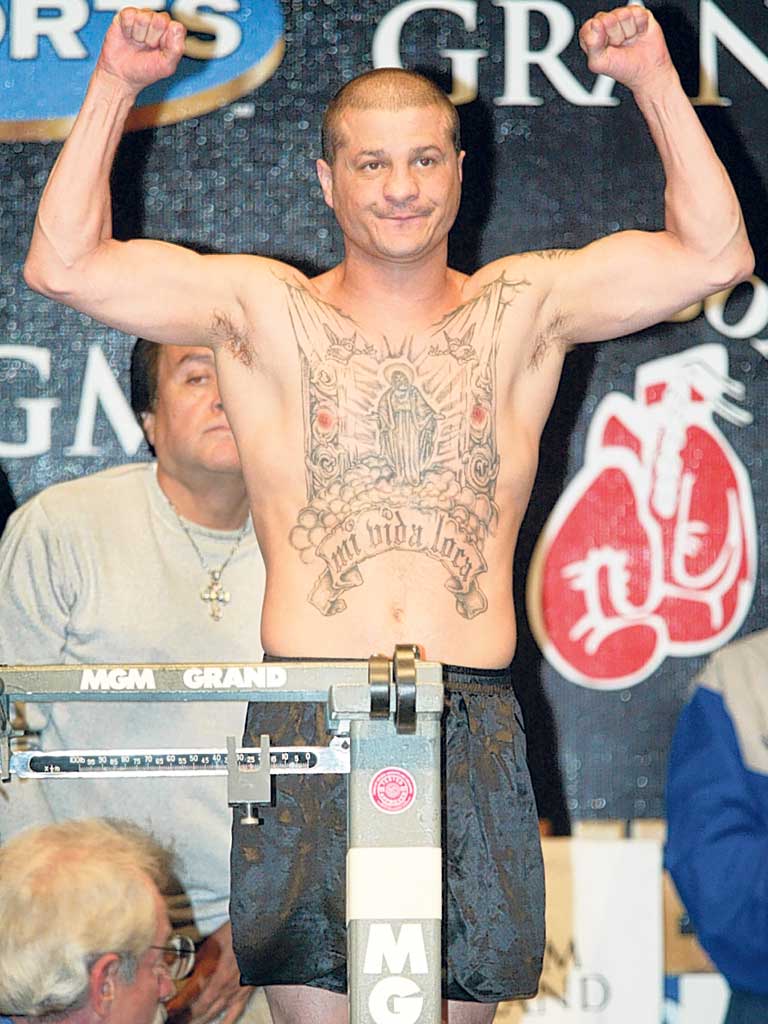Johnny Tapia: World champion boxer with a deeply troubled private life

Johnny Tapia beat death on four separate occasions after overdoses during his deeply troubled life and each time he was surrounded by his family, his friends, veteran priests and doctors. His long-suffering wife Teresa once told me that she held his hand so often because she wanted to be close to his pulse. She was there the first time when he was declared dead for one minute and 23 seconds before coming back to life; later that night Tapia signed his discharge papers and vanished when they arrived home. Tapia somehow slipped the safety net of survival again, only this time he was found dead and alone in his Albuquerque home.
Tapia won and lost three proper world titles during a quite brilliant career in the ring that would have guaranteed him a place alongside some of boxing's best fighters. However, away from the ropes he was arguably the sport's craziest and most tragic man. He had a tattoo that read "Mi Vida Loca" across his stomach, and it certainly was a crazy life.
His first visit to an intensive care unit was in the womb as his mother wept as she watched his father die after a gang shooting. He was back a few years later when a car he was travelling in crashed and the woman next to him was killed.
A year later he was kept from another desperate hospital vigil when his mother fought for 90 hours for her own life. Little Johnny had heard her screams from his bedroom as she was raped, hanged, stabbed 22 times with an ice-pick, chained to the back of a truck and driven off to die. Johnny tried to warn people in the house but they dismissed the eight-year old, thinking he was having bad dreams. "They had no idea," he told me in 2002. "The dreams have never stopped."
His grandparents took charge of Tapia after his mother's death and his life never improved. His grandfather took the skinny little boy to bars where degenerates paid Tapia and other kids a dollar to fight for their drunken pleasure on the floor, at their feet. "It was a bad time," Tapia said. "Nobody could hurt me physically. How could anybody hurt me anymore?" The memory of the sickening fights for the satisfaction of an old man's friends was the closest I ever saw to life in Tapia's blank eyes. The eyes, by the way, were deeply disturbing in their distant stillness.
At 11 Tapia found a boxing gym and his life was given a meaning. He had 123 amateur fights, was ranked nationally and turned professional in 1988 when he was 21. He was unbeaten in 22 fights, 23 years of age, American super-flyweight champion and destined for a world title fight when he walked away to the streets for the first time in 1990. Tapia was a junkie and his savage existence on the margins, courtesy of the brutal deaths of his parents, meant that he was easily sucked into the life that had claimed them and left him scarred. The boxing was not a big enough fix compared to the bullets and needles of his new life.
He returned to the ring in 1994 and seven months later won the first of his three world titles. He was an instant sensation on his return because of his fearless and breathtaking style. Also, word of his life was spreading and his grim tale of survival made him even more popular. "What more could go wrong? I had nothing to worry about. The boxing was safe, easy and I knew that it kept me alive." He never moved far from the drugs and the lunatics even when he was winning massive fights. His car was riddled with bullets, he was busted during drug raids, his arrest sheet in Albuquerque was 125 pages thick and he always found a way to reach a fix and a bit of peace. He thought that he would die at 32 like his mother and each day, as he said, was a bonus.
Tapia fought a total of 66 fights, losing just five, and he shared the ring with some great fighters. His last fight was in June 2011, a win, and it seems the plan, even at 45, was to keep ticking over with fights. "I'm clean today, I was clean yesterday – I don't know about tomorrow and I have no idea what will happen when I stop fighting," Tapia told me in 2003 as he stretched out on a bed in his Glasgow hotel room. "I was raised to fight to the death." He used the same tragic line in his book, Mi Vida Loca, when it was published in 2010.
The only other time I saw his eyes flicker out of their dead setting was when he was given a 10-minute standing ovation in 2002 at York Hall, Bethnal Green. He was a fighter and the fans adored him.
John Lee Tapia, boxer: born Albuquerque, New Mexico 13 February 1967; married 1994 Teresa (two children); died Albuquerque 27 May 2012.
Subscribe to Independent Premium to bookmark this article
Want to bookmark your favourite articles and stories to read or reference later? Start your Independent Premium subscription today.

Join our commenting forum
Join thought-provoking conversations, follow other Independent readers and see their replies